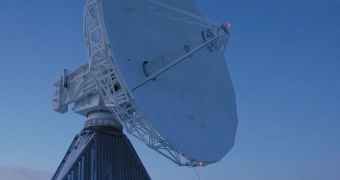Officials at the European Space Agency (ESA) are proud to announce the inauguration of yet another ground station that will contribute to the functioning of the European Union's future Galileo satellite navigation system.
The new facility, opened at a remote location in the Swedish Arctic, will play a critically important role in allowing for data collected by the future satellites to reach governments, institutions, companies and the general public fast and reliably.
According to experts, the base was opened right on time, given that the first Galileo satellites will launch to space in 2011. The new facility is called the Kiruna Galileo Station.
The opening was scheduled in such a way so as to coincide with the popular Swedish celebration of St. Lucy's day. The participants formed a candlelit procession before reaching the construction site.
Once at the facility, European officials explained that this particular location will play a critically important role in 2011, alongside a similar tracking station in French Guyana, where ESA operates its spaceport.
The two Telemetry, Tracking and Command (TT&C) Galileo stations will operate at full capacity during the In Orbit Validation (IOV) Phase of the navigation system project. After the IOV, the real satellites will begin launching from the Kourou Spaceport.
“I am glad to inaugurate this station today. The ground segment of Galileo is getting ready in line with the space segment, the operations, and much more. I have worked on Galileo since its very beginning, and I am happy it is now taking shape,” said René Oosterlinck.
The ESA official is the director of the Galileo Program and Navigation-related Activities. He inaugurated the new facility with Javier Benedicto, the ESA Galileo project manager.
Paul Verhoef, the Program Manager of EU Satellite Navigation Programs at the European Commission, and Lars Persson, President and CEO of the Swedish Space Corporation (SSC), also attended.
“The high-precision Galileo service requires a global network of ground stations to oversee the Galileo satellites in space – comprising a final total of 30 satellites in medium orbits, including three spares,” ESA officials say in a press release.
“The Kiruna station is hosted at Esrange Space Center of the Swedish Space Corporation. It serves as a satellite ground station for control and tracking and launch site for sounding rockets and long duration stratospheric balloons,” it goes on to say.

 14 DAY TRIAL //
14 DAY TRIAL //